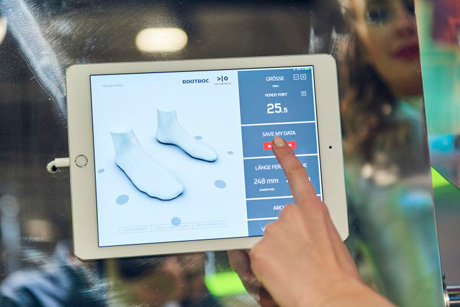
The megatrend known as “individualization” is sweeping through more and more segments of the sporting goods industry.
. ispo.com : Digitalization accelerates individualization - 30 January 2019 - 15:16
ISPO Trend Report. Individualized products are moving to the forefront, creating a broad range of new opportunities for the sporting goods industry in the process. This trend is all about “me, myself and I.” And that should be found in the product being purchased. Examples range from personally designed athletic shoes or skis to customized ski boots. Brands are learning that they must integrate their customers into manufacturing processes or into the late-stage refinement work that goes into their products. The trend is being accelerated by digital gadgets, those popular “wearables” that are actually mini-computers that support athletes during their activities and collect data. These data then form the basis for the manufacture of even more personalized products. At ISPO Munich (February 3–6, 2019), trade visitors will gain a comprehensive overview of today’s and tomorrow’s trends.

The megatrend known as “individualization” is sweeping through more and more segments of the sporting goods industry.
Wearables as a basis for more personalized products
New technologies like 3D printing and advances in artificial intelligence enable sports equipment to be produced increasingly faster and efficiently to meet customers’ specific needs and requests. With the help of data that fitness trackers and other digital devices collect about the body, athletic performance and health, products that match an athlete much like a fingerprint can now be produced. For instance, the ISPO Brandnew Finalist snowcookie of Switzerland has developed a smart ski system that uses sensors—one worn on the user’s chest and the other two attached to the skis—to capture independently the motion of the body and skis. Sunnto, a Finnish expert for athletic watches and the winner of the ISPO Award Winner 2019, has developed the Movesense sensor that can track every movement, physiology in sports and more. The sensor can be used in every sport, including swimming, track and field and skiing. By contrast, the ISPO Brandnew Digital Finalist FiTS offers individual services. The start-up has developed a motivation program that comprises individual training schedules, recipe videos and real-time voice guidance.
Functionally adapted skis and individual boot fitting
Individualization delivers a tremendous amount of added value if the product can be adapted to the user’s own body. This year’s overall winner of the start-up competition ISPO Brandnew, ORGINAL +, is one of the companies that is successfully shaping the individualization trend. With the help of proprietary software based on artificial intelligence, the company produces custom-made skis for individual customers. The software can design a functionally adapted ski by interpreting biometric data and additional information like skiing style and preferred types of slopes.
The scan-fit app from Fischer, a boot-fitting pioneer, facilitates the easy search for the right ski boot. A precise 3D foot measurement calculates the individual boot size to create the perfectly fitting ski and cross-country ski boot.
You will find additional details about the products and other examples in the Winter Sports Trend Report.
Micro-factories and 3D product development of boot upper materials
To meet local or individualized needs in the production process, “micro-factories” represent the future of the clothing industry. They link the 3D simulation of clothing directly to production. It is a milestone along the way to Industry 4.0. In cooperation with the German Institute of Textile and Fiber Research (DITF), ISPO Munich will present the ISPO Textrends Microfactory, where the entire digital process chain from the first virtual design and the digital textile print to automated cutting will be exhibited. The ISPO Textrends Microfactory will form the heart of Hall C4. In cooperation with H. Stoll, a leader in flat-knitting machine technology, the DITF institute will also present the integration of the digital 3D product development of boot upper materials into a fully automatic knitting process. It represents an advance in rapid-prototyping of 3D-knitted products for development and production in the textile value chain.
Press Release
ISPO
01/30/2019